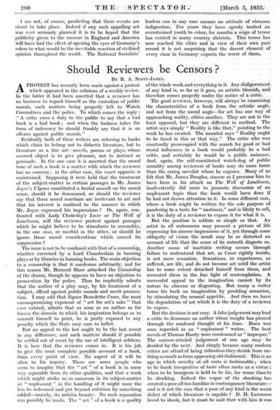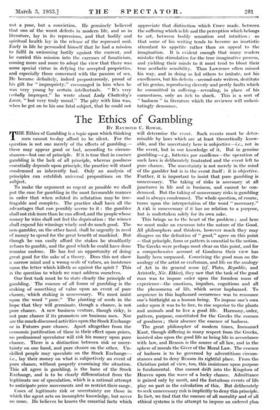Should Reviewers be Censors?
BY R. A. Scorr-JamEs.
APROTEST has recently been made against a protest. which appeared in the coluMns of a weekly review. In the latter it had been asserted that a reviewer has no business to regard himself as the custodian of public morals, such matters being properly left to Watch Committees and the police. To which comes the reply : " A critic owes a duty to the public to say that a bad book is a bad book ; and when the badness takes the form of indecency he should frankly say that it is an offence against public morals."
Evidently both of these writers arc referring to books which claim to belong not to didactic literature, but to literature as a fine art—novels, poems or plays, whose avowed object is to give pleasure, not to instruct or persuade. In the one case it is asserted that the moral tone of such a book is a matter with which the reviewer has.no concern ; in the other case, the exact opposite is maintained. Supposing it were held that the treatment of the subject-matter in certain passages in Mr. James Joyce's Ulysses constituted a brutal assault on the moral sense, should it be denounced, or should the reviewer say that these moral reactions are irrelevant to art and that his interest is confined to the manner in which Mr. Joyce expressed his impressions ? Or, again, con- fronted with Lady Chatlerley's Lover or The Well of Loneliness, will the reviewer protest against passages which he might believe to be stimulants to sensuality„ in the one case, or morbid in the other, or should he ignore those moral considerations which caused its suppression ?
The issue is not to be confused-with that of a censorship, whether exercised by a Lord Chamberlain in banning plays or by libraries in banning books. The main objection to a censorship is that it condemns arbitrarily, and for this reason Mr. Bernard Shaw attacked the Censorship of the drama, though he appears to have no objection to prosecution by the police. Thus he implicitly admits that the author of a play may, by his treatment of a subject, offend against public morals and merit prosecu-. tion. I may add that Signor Benedetto Croce, the most uncompromising exponent of " art for art's sake !' that ever existed, admits that as soon as an author so far leaves the domain to which his inspiration belongs as to commit himself to print, he is justly exposed to any penalty which the State may care to inflict.
But an appeal to the law ought to be the last resort in any difference, and such matters should if possible be settled out of court by the use of intelligent arbiters. It is here that the reviewer comes in. It is his job to .give the most complete possible account of a book; from every point of view. No aspect of it will be alien to his inquiry. There are some people who seem to imagine that the " art " of -a book is in some way separable from its other qualities, and that a work which might strike us as nauseous in its subject-matter or " unpleasant " in the handling of it -might none the leSs be redeemed and put beyond criticism by something added—namely, its artistic beauty. No such separation can possibly be made. The " art " of a book- is-a quality of the whole work and everything m it. Any disfigurement, of any kind is, so far as it goes, an artistic blemish, and therefore. comes properly under the notice of a critic.
The good reviewer, however, will always be examining the characteristics of a book from the artistic angle, and not from the moral angle—for art has one way of approaching reality, ethics another. They are not in the least opposed, but they are different in method. The artist says simply " Reality is like that," pointing to the. work he has created. The moralist says " Reality ought to be faced in this or that Way." The critic who was' constantly preoccupied with the search for good or bad moral influences in a book would probably be a bad critic, and certainly he would be a public nuisance. And, again, the self-constituted watch-dog of public morality among reviewers of books may do more harm than the erring novelist whom he exposes. Many of us felt that Mr. James Douglas, sincere as I presume him to have been in his attack on The Well of Loneliness, inadvertently did more to promote discussion of an unpleasant topic than the book would have done if he had not drawn attention to it. In some different case, where a book might be written for the sole purpose of pandering to a taste for " nastiness," and is likely to sell, it is the duty of a reviewer to expose it for what it is.
But the position is seldom so simple as that. An artist in all seriousness may present a picture of life expressing his sincere impressions of it, yet through some obliquity of vision the result may be so distorted an account of life that the sense of its untruth disgusts us. Another cause of inartistic writing occurs through failure to understand that art, as Croce rightly insists, is not mere sensation. Sensations, or experiences, as suffered, are life, and do not become art until the artist has to some extent detached himself from them, and recreated theM in the fine light of contemplation. A successful appeal to the imagination cannot by its nature be obscene or disgusting. But many a writer turns his back on imagination by prodding sensation, by stimulating the sensual appetite. And then we have the degradation of art which it is the duty of a reviewer to expose.
But the decision is not easy, A false judgement may lead a critic to denounce an author whose insight has pierced through the confused thought of his time. Ibsen was once regarded as an " unpleasant " writer. -The best novels of Thomas Hardy were condemned as " improper." The narrow-minded judgement of one age may- be derided by the next. And simply because many modern critics are afraid of being ridieulous they shrink from no- thing so much-as from appearing old-fashioned. This is an age in which novelty -at 'all costs is fashionable ; when to be frank irrespective of taste 'often ranks as a virtue when to be bourgeois is held to be far, far worse than td be shocking. Indeed the vogue of the shocking has created a pose all too familiar in'contemporary literature— and is it not the case that a pose of any kind is the worst defect of which literature is capable ? D. H. Lawrence loved- to shock; but -it Must be said that with him it was not a pose, but a conviction. He genuinely believed that one .of the worst defects in modern life, and so in literature, lay in its repressions, and that bodily and spiritual health lay in the release of the repressed soul. Early in life he persuaded himself that he had a mission to fulfil in swimming lustily against the current, and he carried this mission into the excesses of fanaticism, coming more and more to adopt the view that there was some special virtue in defying the accepted proprieties, and especially those concerned with the passion of sex. He became definitely, indeed preposterously, proud of his gift for " impropriety." encouraged in him when he was very young by certain intellectuals. " It's very verbally improper," he wrote about Lady Chatterley's Lover, " but very truly moral." The pity with him was, when he got on to his one fatal subject, that he could not
appreciate that distinction which Croce made, between the suffering whieh is life and the perception which belongs to art, between bodily sensation and intuition ; so that some of his writing tends to become an inartistic stimulant to appetite rather than an appeal to the imagination. It is evident enough that many readers mistake this stimulation for the true imaginative process, and yielding their minds to it must tend to blunt their true aesthetic sensibility. Thus Lawrence often missed his way, and in doing so led others to imitate, not his excellences, but his defects—second-rate writers, destitute of his genius, reproducing cleverly and pertly faults which he committed' in suffering—revealing, in place of his earnestness, only an itch to shock. This is a sort of " badness " in literature which the reviewer will unhesi- tatingly denounce.



















































 Previous page
Previous page